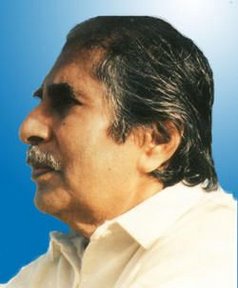- Shaikh Ayaz
Infobox Person
name = Mubarak Ali Shaikh "Ayaz"
شيخ اياز

image_size = 190px
caption = Shaikh Ayaz
birth_date = birth date|1923|03|23|mf=y
birth_place =Shikarpur Sindh ,Pakistan
death_date = death date|1997|12|28|mf=y
death_place =Karachi , buried atBhit Shah Shaikh Ayaz (Sindhi: شيخ اياز) was one of the major Sindhi poets of
Pakistan . By profession he was a lawyer but he also served as the vice chancellor ofSindh University . The people of Sindh province, in Pakistan, admire his poetry greatly. In Sindhi poetry he is considered likePablo Neruda to theLatin America . His poetry brought new trends in Sindhi literature. His poetry has high aesthetic value.The work of a great poet represents the coming together of different and discordant elements. Shaikh Ayaz too is such a poet. In one of his early poems he writes of the two deities from classical
India :Saraswati , the goddess of knowledge and music sitting together withKali , the wanton goddess of blood and violence, the two of them sipping nectar in a moon-lit temple. "How have the two come together?" the poem contemplates and then comes up with the answer: Perhaps a great poet has been born. Ayaz's poetry must have been born in such an instant since it represents the coming together of diverse elements --- beauty and the shadow of death. Shaikh Ayaz is one of the major voices in twentieth century poetry. His literary career spanned almost six decades and displayed an amazing variety in poetry and prose, ranging from the traditional "bait", "wa'i" and "ghazal" to plays in verse, prose poems and even musings, and extending to short fiction, memoirs and journals, polemical andliterary essays ,newspaper articles , editorials, even a projected novel. To each genre he brought his unique vision and transforming power oflanguage .Activity and poetry
Shaikh Ayaz's work is spontaneous, objective and forceful. He defiantly wrote verses on every such topic which was hated by the establishment. He was incarcerated many times for his "seditious" writings and was also sentenced to death, but escaped gallows due to the sudden change of
government .He wrote short stories, novel, essays, poetry, travelogues, diaries, an autobiography and the translation of
Shah jo Risalo in Urdu. He also composed poetry in Urdu and two of his anthologies,"Booye Gul, Nala-i-dil" and "Neel Kanth Aur Neem Ke Pate" were highly acclaimed. He portrayed the miseries of suffering humanity, the sorrows of the deprived and the wretched conditions of the exploited masses who had been suffering at the hands of an unjust system for centuries.Through his poetry, Shaikh Ayaz battled against One Unit and the military dictatorship of Ayub Khan. During the anti One Unit campaign one of his poems "Sindhri taan sir ker na deendo", "sanhando ker mayar" (Is there anybody who will not sacrifice his head for Sindh, and be ashamed of it)", became very popular among the people of Sindh and subsequently its broadcast was banned from
Radio Pakistan . He was banned for a number of times from cities and towns where he was to participate in Mushairas. Three of his anthologies - "Bhounr Bhare Akas", "Kulhe Patam Keenaro" and "Je Kak Kakoriya Kapri" drewsharp criticism from fundamentalists and the government denounced them.He was one of those brave writers who wrote against the tyrannical rulers and the wars they waged. During the
Indo-Pak war of 1965 , he wrote a poem about progressiveSindhi poetSuragwasi Narain Shayam - who had migrated to India after independence. It goes like this:"He sangram!
"samhoon Aa
"Narayan Shayam!
"hina ja munhinja
"Qola bi saGya
"Boola bi saGya
"hoo kavita jo kaaka-dharni, para
"munhinja ranga-ratola bi saGya
"DHatu bi saGyo
"DHolu bi saGyo
"hanou bi saGyo
"hola bi saGya
"huna tay keean bandooka KhaRNa maan!
"hina Khay golee keean haRNa maan!
"keean haRNa maan!
"keean haRNa maan!
"keean haRNa maan!
"Translation:
This sangram!
in front is
Narain Shayam!
His and mine
tales are the same
promises are the same
He is the king of poetry, but
my colorful ways are also same
land also same
beloved also same
heart also same
horrors also same
How can I point a gun to him!
How can I shoot him!
How can I shoot!
How can I shoot!
How can I shoot!
Shaikh Ayaz's poetry played a major role in the development of
progressive thinking in the country, particularly inSindh . He was the very imprint ofShah Latif 's mystic poetry and will always be remembered as a greathumanist andartist .ee also
*
Sindhi
*Sindhi poetry
*Sindhi literature
*List of Sindhi language poets
*Shah Abdul Latif Bhittai
*Shikarpur
*Sindhi Shaikh External
* [http://www.suhaee.com/shaikhayaz.htm| Suhaee Shaikh Ayaz]
* [http://wwww.itsgrouplrk.com| ITs Groups]
Wikimedia Foundation. 2010.
